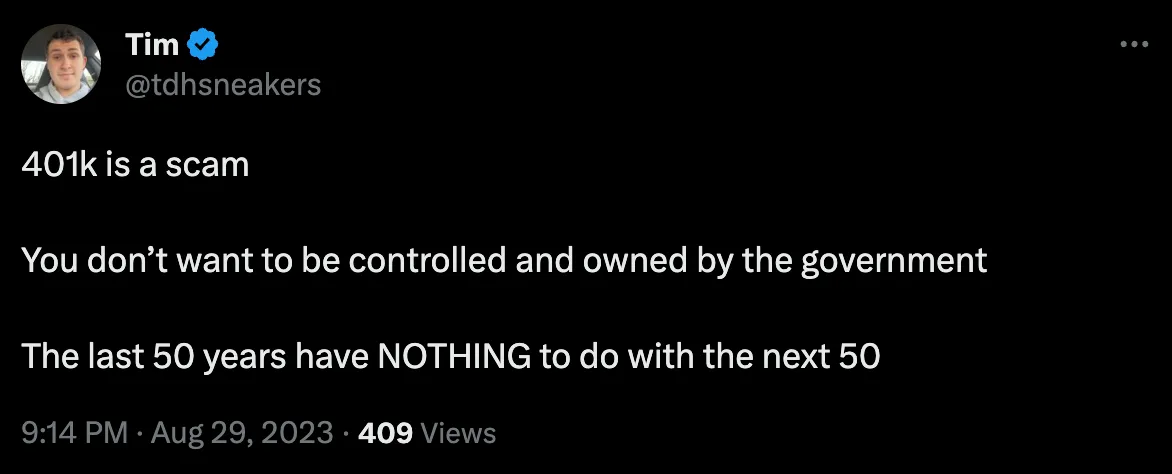There seems to be an increasing amount of people giving financial advice on social media. And while there’s nothing inherently wrong with this, (there’s no one source of information that’s the arbiter of all financial truth) much of the advice I see is… to put it politely, iffy.
I’ve recently come across some of this “iffy” advice in the form of TikToks and tweets stating 401(k)s are a scam and under no circumstances should you ever put any money into a 401(k).
Here are a few examples:
*Click on the first two tweets to watch the videos.
So, I wanted to examine a few of the common claims made again 401(k)s in posts like these to see if they have any validity.
“Your 401k is a bad investment!”
I’ve seen this statement thrown around on a few occasions, and in order to address it I feel like we need to start with some basic education, like a definition of what a 401(k) is.
A 401(k) is an investment account, typically offered by companies to their employees, that has special tax benefits.
A 401(k) is not an investment. A 401(k) is not an asset. It is simply an account that holds your investments.
Your plan provider will have a list of investment options to choose from when you set up your 401(k). How fast your money grows or how much the balance moves up and down is all determined by the investments inside of the account.
So, if you’re disappointed with the performance of your 401(k), it’s not the account’s fault, but rather that of the person who chose the investments within the account.

“Your 401(k) benefits your employer and the government, not you!”
This is an, uh, interesting argument against 401(k)s.
Most employers will match any contributions you make to your 401(k) up to a certain percentage of your paycheck. For example, if you contribute 5% of your salary, then your employer will also contribute an additional 5% to your account. This is an awesome benefit almost everyone should be taking advantage of if available.
To respond to the tweet I shared above, yes, it’s “free money.” An employer match is part of your total compensation package.
However, I’ve seen some people in these TikTok videos argue that because the employer gets a deduction for these matching contributions, the only reason they do a match is for the company’s benefit.
First, I sense that the people who say this don’t quite understand what a tax deduction is. The cost to offer a 401(k) match for companies exceeds to the tax deduction they receive. Companies would keep more money in their pockets if they didn’t provide a match.
Second, you know what else is tax deductible for employers? Your entire salary. It’s a business expense. So, does that mean your salary is a scam?

As far as the government part of this goes, I’m not quite sure how 401(k)s benefit the government and not the individual contributing to the 401(k).
In fact, the reason 401(k)s are an advantageous place to invest your money is you get a tax benefit for doing so. A traditional 401(k) is a pre-tax retirement account, meaning that your taxable income is reduced by the amount contributed to the account. In other words, you don’t pay taxes on the amount you contribute. By contributing to a 401(k), you are giving the government less money.
The money in the account is invested, it grows tax-free, and then income taxes are due when you take out the money in retirement.
The reason you’d want to avoid taxes now and pay them later is that the overwhelming majority of people will be in a higher income tax bracket when they’re working compared to when they’re retired. Around 80% of people have an effective tax rate of 0% in retirement.
To use a straightforward example, if you contributed $1,000 per month to a 401(k) for 25 years, at an 8% annual return your money would grow to around $880,000. If you were in the 24% marginal income tax bracket that entire time, you would have saved over $72,000 in taxes. Not too shabby.
“Your money is locked up forever in a 401(k)!”
Now, in exchange for that tax benefit, there are rules for the account. You’re only allowed to contribute a certain amount each year (up to $22,500 for 2023, not including an employer match) and you can’t take your money out of the account before you reach age 59 1/2 without incurring a 10% penalty.
So in a sense, yes, your money is “locked up” until you’re 59 1/2. But it’s not inaccessible. There are certain hardship exceptions where you can take withdrawals without incurring the 10% penalty. If you really need the money, you can always pay the 10% penalty and get access to your funds.
However, because of this penalty, any money that you put into a 401(k) should be money that you won’t need to use until you retire.
Because life is unpredictable and you never know when you may need the money you’ve stashed away, I think it’s prudent to balance your savings between a 401(k) and a regular investment account that you can access without penalty for things like a house down payment, a career change, or whatever else life decides to throw at you.
On the flip side of this argument, the “locked up” nature of a 401(k) has some serious behavioral advantages that help a lot of people. The funds are automatically taken from your paycheck and invested regularly while the barrier to accessing the money forces you to keep the money invested which leads to superior investment performance over time.
The best investment is one you can stick with and let compound interest work in. your favor. And people tend to stick with 401(k)s for a long time.

In short, are 401(k)s a scam?
No. I don’t think so.
Pretty much everyone I talk to wants to pay less taxes.
And whether people want to or not, pretty much everyone I talk to knows they need to save and invest for retirement.
A 401(k) is a great way to accomplish both of these objectives at the same time.
Thanks for reading!
For more information about setting up and managing a 401(k) for your practice, visit our 401(k) Setup Guide.
This article was originally featured on “Money Talks” Substack.

Jake Elm, CFP® is a financial advisor at Dentist Advisors. Jake a graduate of Utah Valley University’s nationally ranked Personal Financial Planning program. As a financial advisor at Dentist Advisors, he provides dentists with fiduciary guidance related to investments, debt, savings, taxes, and insurance. Learn more about Jake.








